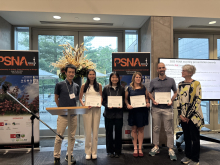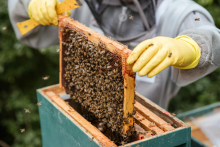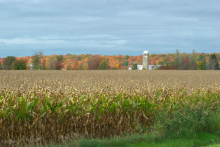Congratulations to two plant science students in Professor Mehran Dastmalchi's lab, who received awards for their presentations at two recent conferences!


In a recent article for their What's In My Cart? series, the Globe and Mail profiles 72-year-old Julia Common, a beekeeper based in Delta, B.C. She says she was hooked on bees the first time her hands entered a hive, when she was only 21 and enrolled in agricultural studies at McGill University’s Macdonald Campus, near her hometown of Montreal.

From lab benches to local watersheds, McGill researchers are investigating some of today's most pressing water challenges.
Several exciting projects involving researchers in the Faculty of Agricultural and Environmental Sciences (AES) were selected for seed funding through two initiatives: the Brace Water Innovation Seed Grants and the Brace Water Centre and CentrEau Project Seed Fund Program.

Earlier this month, the McGill University Health Centre (MUHC) marked National Indigenous Peoples Day (June 21) with a special Indigenous-inspired cafeteria meal, featuring baked salmon, wild rice salad, and blueberry bannock.

French doctors are raising the alarm about rising exposure to cadmium, a toxic heavy metal found in phosphate fertilizers. Cadmium is a known carcinogen linked to kidney damage, bone disease, and other long-term health issues, even at low doses. French doctors are urging France's government to tighten fertilizer regulations to reduce this public health risk.

A surprising number of hummingbirds are falling ill, and experts say your birdfeeder may be to blame.
Ornithologist and McGill Professor Emeritus David Bird spoke to CBC about how to keep your feathered friends safe.

In the wake of soaring cocoa prices, Isabelle Lam, BSc(NutrSc)’19, co-founder of Remix Snacks, spoke to the Globe and Mail about innovation in an unpredictable economy.
Remix Snacks is known for it’s bean bark, a high-protein, high-fibre snack made with upcycled imperfect fruit, black beans, and 70% dark chocolate, which Lam and co-founder Jamie Lee, BSc(NutrSc)’19, developed while studying Nutrition at McGill University's Macdonald Campus.

A new study, led by researchers at Aarhus University in Denmark, suggests that levels of mercury in Arctic wildlife could continue to rise significantly even as countries curb their emissions. The researchers' analysis indicates that ocean currents are distributing large, century-old stores of mercury through marine ecosystems in the Arctic.
Large predators end up ingesting the most mercury through their diet of contaminated prey. This poses a serious problem for communities that hunt marine mammals with high concentrations of mercury, like seals.

Congratulations to McGill Plant Science students Henry Cordoba Novoa and Mason Jackson, who were awarded top honours at the National Association of Plant Breeding Conference, which took place in Hawaii from May 19 to 23, 2025.
Cordoba Novoa won first place in the Ph.D. poster competition for his poster on improving the understanding and breeding of common bean using multiple genome-wide approaches and the study of the accumulation partners of deleterious mutations in breeding populations.

The Society of Canadian Ornithologists has selected Professor Emeritus David Bird and retired Associate Professor Rodger Titman, who both taught for many years in McGill University's Department of Natural Resource Sciences, to receive the Jamie Smith Memorial Mentoring Award. This award recognizes exceptional contributions to the training and fostering of Canadian ornithologists.

For the first time, scientists have successfully edited oat DNA, a breakthrough that could accelerate the development of oats with more fibre, higher yields, and greater resilience to climate change.
Oats, a key crop both for human consumption and animal feed, are a major agricultural product in Canada, contributing to a global market work $8 billion. The Canadian oat crop is estimated to be worth approximately $900 million. But a short growing season and unpredictable late-season frost mean Canadian oat farmers face significant challenges.
Recently, the Canadian Nutrition Society held its annual conference, where awards were distributed to winners of the society's poster presentations. Among them, two McGill University grad students studying nutrition were recognized.
Ferial Hamdi, M.Sc. Thesis student with Prof. Brittany Jock (formerly of the School of Human Nutrition), won the George Beaton Award for Student Work in Public Health Nutrition and took second place in the Graduate Oral Competition

The Canadian Society of Plant Biologists has selected Jaswinder Singh, Professor at McGill University's Department of Plant Science, to receive the 2025 Mary E. Spencer award, which recognizes outstanding plant biology research contributions and active public service engagement in the plant biology community.

In the IGA and Metro grocery stores visited this week by Le Journal de Montréal, the price per pound of discounted products appeared on signage, but the regular price per pound was still not indicated, contrary to a new regulation that came into effect on May 7 which requires that grocers to "indicate a single unit of measurement for all goods of the same type." This rule aims to allow consumers to easily compare prices.

As McGill’s Class of 2025 prepares to cross the stage, the 10 valedictorians from Faculties across the University—including Andre Hadji-Thomas and Jennifer McDonald in the Faculty of Agricultural and Environmental Sciences—have been drafting their speeches and, in the process, reflecting on much more than their academic success.
